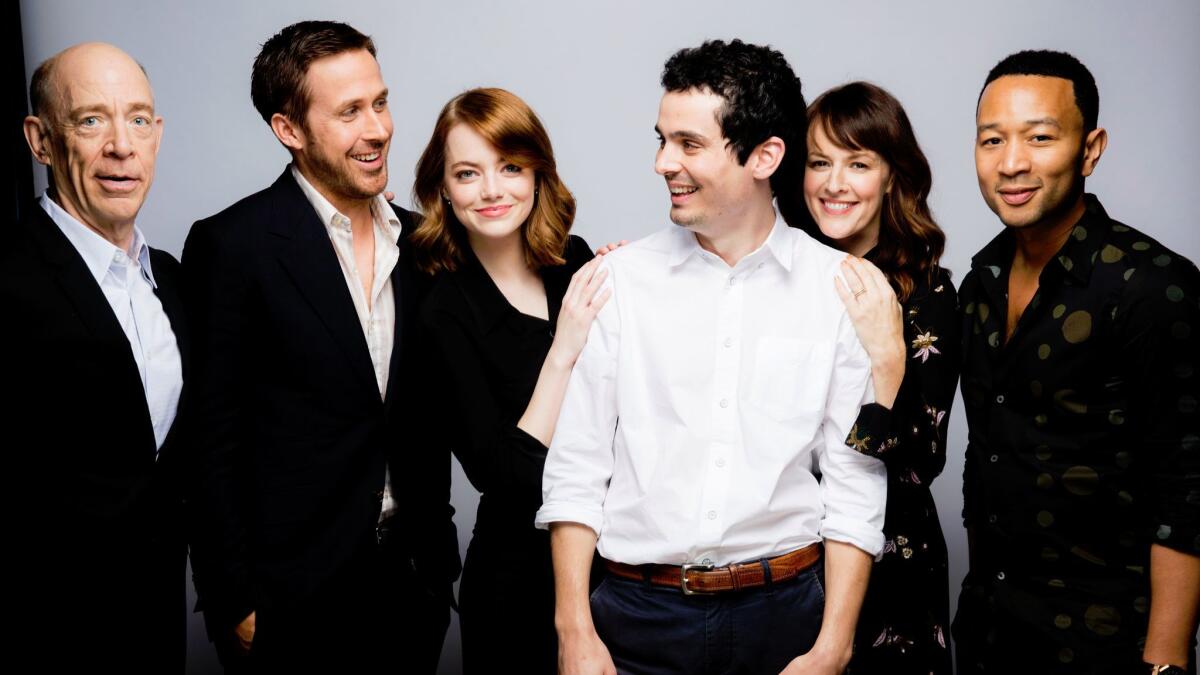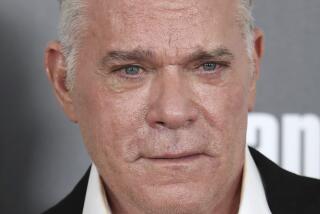‘La La Land’ director Damien Chazelle writes about his favorite musicals

Writer-director Damien Chazelle’s new film “La La Land” is an unabashed love letter to the movie musical. The film, which opens Dec. 9, stars Emma Stone and Ryan Gosling, who sing and dance their way around Los Angeles (including on a freeway).
Music is clearly in Chazelle’s filmmaking blood; his last movie, “Whiplash,” about a talented young drummer and his sadistic teacher, featured jazz as a key component of the storytelling. We asked Chazelle to reflect on his feelings about film musicals — and to pick out some that influenced him the most.
Musicals are about a very simple idea. If you feel enough — if you’re in love enough, joyful enough, heartbroken enough — then the rules of the ordinary world will cease to apply. You can break into song, an evening stroll can turn into a dance, and that mythical 90-piece orchestra can arrive from the heavens to score it all.
There’s real audacity in that idea. That’s what I love about musicals: They favor emotions over logic. They’re not a literal reflection of life — they’re about how life feels.
In that sense, I think the musical can be just as truthful as any realist genre. Musicals can get at the way it feels to hold hands in a movie theater, when your heart is beating a thousand times per second. They can nail what it feels like to fall in love. They can describe with absolute accuracy what it’s like to stubbornly cling to a dream when the odds seem stacked against you, and the pain you feel when that dream is dashed. Likewise, they can capture like no other genre the joy and the triumph when the dream comes true.
That’s the idea that was at the heart of “La La Land.” I wanted to make a movie that would embrace the magic of musicals but root it in the rhythms and texture of real life. I wanted the dances to feel like honest extensions of the characters’ feelings. I wanted to make it seem as though breaking into song were the most natural thing in the world. I wanted to make a movie about how life feels when you’re in love and full of dreams in the big city.
I was inspired by dozens of movies. These are just a handful.
“Love Me Tonight” (1932)
Director: Rouben Mamoulian
Stars: Maurice Chevalier, Jeanette MacDonald
Watching this movie, you get the feeling of a genre that’s still figuring itself out. There’s an almost frenzied sense of play here: fairy-tale sets, bravura editing, Maurice Chevalier in peak form. But it all begins with what appears at first to be documentary footage: Paris at dawn. All is quiet. No music, barely any sound. Then one storefront opens. Then another. A wheelbarrow rolls against cobblestones. A broom begins sweeping dust.
One by one, the sounds accumulate, build, cascade — until we hear them in rhythm, and a full-blown musical number is born. In a few seconds, we have gone from unvarnished reality to pure fantasy. It’s a miraculous transition, and a reminder of a time when sound on film was still new and the musical was still in its infancy.
“Summer Stock” (1950)
Director: Charles Walters
Stars: Judy Garland, Gene Kelly
This Gene Kelly-Judy Garland two-hander is all kinds of dazzling, but the scene that gets me the most here is the movie’s quietest. Kelly is alone on a stage, and he notices that one of the floorboards creaks. There’s also a stray newspaper that has fallen. The creaky board and the newspaper — that’s all Kelly needs to concoct an absolutely magical movie moment. The technique of the dancing here is stunning, but it’s the idea behind it all that really moves you: magic can be found in the most everyday settings, among the most mundane things.
“The Band Wagon” (1953)
Director: Vincente Minnelli
Stars: Fred Astaire, Cyd Charisse
Vincente Minnelli, Fred Astaire and Cyd Charisse — hard to go wrong with those three. The fluidity of Minnelli’s camerawork here is astonishing — so supple and graceful — and the whole movie is so much damn fun. What you’re left with more than anything, though, is the movie’s depiction of a performer coming to terms with irrelevance.
Like a more hopeful version of Chaplin’s “Limelight,” it’s a great portrait of the artist as an older man, learning what to hold on to, what to adapt to — in short, how to live. Astaire performs it all brilliantly, and the movie achieves one of the great tricks in musicals: Underneath the Technicolor razzle-dazzle and the swinging score, it’s a thoughtful, bittersweet story about aging, compromise and second chances.
“Touki Bouki” (1973)
Director: Djibril Diop Mambéty
Stars: Magaye Niang, Mareme Niang
This movie by Djibril Diop Mambéty bursts with energy and brio, and it’s got such verve and immediacy that it seems perpetually modern. At its heart it’s a melancholy story of two young lovers with big dreams, and a portrait of a society grappling with transition. It uses music to map those dreams and that transition: A Josephine Baker song becomes a refrain, while a host of other musical forms collide and mix. What French new wave “quasi-musicals” like “A Woman Is a Woman” or “Shoot the Piano Player” did for France in the ’60s, this does for Senegal in the ’70s. It’s not a full-fledged musical, but it’s musical filmmaking at its greatest.
“Beau Travail” (1999)
Director: Claire Denis
Stars: Denis Lavant, Michel Subor
Also not really a “musical,” per se, but this movie by Claire Denis contains one of the single greatest dance scenes in the history of cinema, so I can’t not include it. I don’t want to give away too much, but I’ll say this: The scene features Denis Lavant, the great French actor who’s been at the center of other extraordinary musical numbers in non-musicals (see the Leos Carax movies “Mauvais Sang,” “The Lovers on the Bridge” and “Holy Motors”), and like many great musical numbers this one serves as the culmination of layer upon layer of unspoken feelings. It’s a defining moment for the character and the story, a moment when emotion does finally trump logic — and it’s one of the most euphoric and moving things I’ve ever seen in a film.
More to Read
Only good movies
Get the Indie Focus newsletter, Mark Olsen's weekly guide to the world of cinema.
You may occasionally receive promotional content from the Los Angeles Times.






